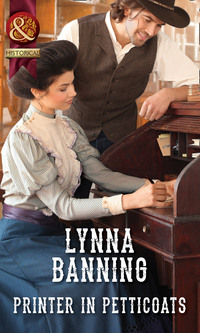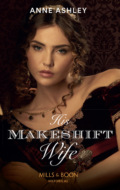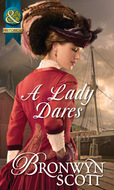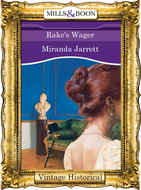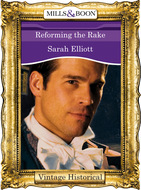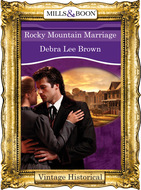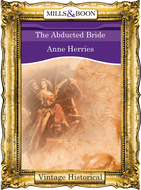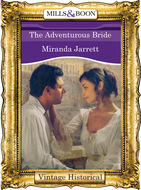Raamatut ei saa failina alla laadida, kuid seda saab lugeda meie rakenduses või veebis.
Loe raamatut: «Printer In Petticoats»
“Do I make you nervous, Jessamine?”
“What? Of course not. What would I have to be nervous about?”
He took a step closer and she backed up. “Me, maybe?” he said. He sent her a grin that seemed positively wicked.
“N-no,” she blurted out. “Not you.”
“My newspaper?”
“Of course not. I’m not afraid of a little competition.”
It’s you I am afraid of. She cringed inwardly at the admission. She squared her shoulders and forced her eyes to meet his.
“Yeah? Then how come you”re edging toward the door, Miss Lassiter?”
“I’m not!”
But she was. She couldn’t get away from those laughing blue eyes fast enough.
Author Note
It’s a myth that women of the Old West were solely wives and mothers. Women were as intelligent, courageous and enterprising in the eighteen-hundreds as they are now. Many of them ran ranches, owned and operated dressmaking and millinery shops, hotels, boarding houses, restaurants and saloons, and even newspapers—as this story will demonstrate. They also worked as teachers, housekeepers, nannies and cooks, and engaged in dozens of other ventures to make their livings. In addition women were engaged in the arts, as painters, writers, lecturers and photographers, and it is to these intrepid females we owe much of our knowledge and appreciation of nineteenth-century life and culture.
Printer in
Petticoats
Lynna Banning

LYNNA BANNING combines her lifelong love of history and literature in a satisfying career as a writer. Born in Oregon, she graduated from Scripps College and embarked on a career as an editor and technical writer, and later as a high school English teacher. She enjoys hearing from her readers. You may write to her directly at PO Box 324, Felton, CA 95018, USA, email her at carowoolston@att.net or visit Lynna’s website at lynnabanning.net.
MILLS & BOON
Before you start reading, why not sign up?
Thank you for downloading this Mills & Boon book. If you want to hear about exclusive discounts, special offers and competitions, sign up to our email newsletter today!
Or simply visit
Mills & Boon emails are completely free to receive and you can unsubscribe at any time via the link in any email we send you.
For David Woolston
Contents
Cover
Introduction
Author Note
Title Page
About the Author
Dedication
Chapter One
Chapter Two
Chapter Three
Chapter Four
Chapter Five
Chapter Six
Chapter Seven
Chapter Eight
Chapter Nine
Chapter Ten
Chapter Eleven
Chapter Twelve
Chapter Thirteen
Chapter Fourteen
Chapter Fifteen
Chapter Sixteen
Chapter Seventeen
Chapter Eighteen
Chapter Nineteen
Chapter Twenty
Chapter Twenty-One
Chapter Twenty-Two
Chapter Twenty-Three
Chapter Twenty-Four
Chapter Twenty-Five
Chapter Twenty-Six
Chapter Twenty-Seven
Chapter Twenty-Eight
Chapter Twenty-Nine
Extract
Copyright
Chapter One
Smoke River, Oregon, 1870
Jessamine glanced up from her rolltop desk in front of the big window in her newspaper office and narrowed her eyes. What on earth...?
Across the street a team of horses hauling a rickety farm wagon rolled up in front of the empty two-story building that until a week ago housed the Smoke River Bank. A brown canvas cover swathed something big and bulky in the wagon bed.
She couldn’t tear her gaze away. A tall, jean-clad man in a dusty black Stetson hauled the team to a stop and jumped down. He had a controlled, easy gait that reminded her of a big cat, powerful and confident and...untamed. His hat brim shaded his face, and his overlong dark hair brushed the collar of his sweat-stained blue work shirt.
She sniffed with disdain. His grimy clothes suggested he needed a bath and a barber, in that order. He was just another rough, uncultured rancher come to town with a load of...what? Sacks of wheat? A keg or two of beer?
The man untied the rope lashing the dirty canvas over whatever lay beneath, and she stood up and craned her neck to see better.
Oh, my father’s red suspenders, what is that?
The barber, Whitey Poletti, and mercantile owner Carl Ness put down their brooms and ambled across the street to see what was going on. In two minutes, Mr. Rancher had talked them into helping him unload the bulky object. He loosened the ropes securing the thing, lowered the wagon tailgate and slid a couple of wide planks off the back end. Then he started to shove whatever it was down onto the board sidewalk.
The canvas slipped off and Jessamine gave an unladylike shriek. A huge Ramage printing press teetered on the wagon bed.
A printing press? Smoke River already had a printing press—hers! Her Adams press was the only one needed for her newspaper—the town’s only newspaper.
Wasn’t it?
She found herself across the street before she realized she’d even opened her office door. “Just what do you think you’re doing?” she demanded.
Mr. Rancher straightened, pushed his hat back with his thumb and pinned her with the most disturbing pair of blue eyes she’d ever seen. Smoldering came to mind. Was that a real word? Or maybe they were scandalizing? Scandalous?
“Thought it was obvious, miss. I’m unloading my printing press.” He turned away, signaled to Whitey and Carl, and jockeyed the huge iron contraption onto the boardwalk.
“What for?” she blurted out.
Again those unnerving eyes bored into hers. “For printing,” he said dryly.
“Oh.” She cast about for something intelligent to say. “Wait!”
“What for?” he shot from the other side of the press.
“What do you intend to print?”
“A newspaper.”
“Newspaper? But Smoke River already has a newspaper, the Sentinel.”
“Yep.”
“So we don’t need another one.”
“Nope.” He stepped out from behind the press and propped both hands on his lean hips. “I’ve read the Sentinel. This town does need another newspaper.”
“Well! Are you insulting my newspaper?”
“Nope. Just offering a bit of competition. A lot of competition, actually. Excuse me.” He brushed past her and hefted one corner of the press. Then the three men heaved and pulled and frog-walked the bulky machine up the single step of the old bank entrance and through the doorway.
Well, my stars and little chickens, who does he think he is?
She tried to peer through the bank’s dust-smeared front window, but just when she thought she saw some movement, someone taped big sheets of foolscap over the panes so she couldn’t see a thing.
She waited until Carl and the barber exited and walked back across the street.
“Afternoon, Miss Jessamine,” Whitey said amiably.
Her curiosity got the better of her. “What is that man doing in there?”
“Movin’ in,” Carl offered. “Gonna sleep upstairs, I reckon. No law against that.”
Jessamine swallowed a sharp retort. She couldn’t afford to insult a paying customer, even one who was at the moment helping her competition. She needed every newspaper subscriber she could get to keep her paper in the black. She had to admit that she was struggling; ever since Papa died, her whole life had been one big struggle with a capital S.
Carl marched past the bushel baskets of apples in front of his store and disappeared inside. The barber lingered long enough to give her a friendly grin.
“Like Carl says, no law against livin’ upstairs. Specially seein’ as how you’re doin’ the same thing.”
“That man needs a haircut,” she retorted. She was so flustered it was the only thing she could think of to say.
Whitey nodded. “So do you, Miss Jessamine. Gonna catch them long curls of yours in the rollers of yer press one of these days.”
Jessamine seized her dark unruly locks and shoved them back behind her shoulders. The barber was right. She just hadn’t had time between setting type and soliciting subscribers and writing news stories to tend to her hair. Or anything else, she thought morosely. There weren’t hours enough in the day to deal with everything that had been dropped on her.
Wearily she plodded back to her office across the street and dragged out her notepad and a stubby, tooth-marked pencil. “New printing press arrives in Smoke River,” she scrawled. “Bets taken on longevity.”
* * *
Cole finished cleaning the last speck of trail dust off his Ramage press, dropped the kerosene-soaked rag in the trash basket and went upstairs to unload his saddlebags. In the small bedroom he found a narrow, uncomfortable-looking cot flanked by two upended fruit crates, one of which supported an oil lamp and a grimy china washbasin. Home sweet home.
He plopped his four precious books on top of the other crate and stood staring out the multipaned window. Directly across the street he saw the Smoke River Sentinel office.
He’d known there was another newspaper in town; he just hadn’t expected it to be located so close. Well, maybe that was a blessing. He could keep a sharp eye on the competition. Still, it was a mite more than he’d bargained for.
Was that spunky miss with all the questions the typesetter? Or the sister of the printer? Or the daughter...maybe even the wife? Pretty little thing. Rude, too. Never even introduced herself.
Well, neither had he. He must smell like a randy goat after the eighteen days he’d spent hauling that press from Kansas City. No wonder the little lady didn’t introduce herself. Better rustle up a bucket or two of water for a spit bath tonight.
Tomorrow he’d stop in and make nice, but right now he was dog-tired. All he wanted was a shot of whiskey, a steak two inches thick and twenty-four hours of sleep.
Two doors down, the Golden Partridge Saloon beckoned, and next to that was the Smoke River restaurant. Handy. He swiped his hand over his stubbly chin, finger-combed his hair and set off down the street.
The whiskey was smooth, the steak rare and the bucket of water he hauled up to his living quarters was free. Couldn’t beat that. He stripped, sponged off four states’ worth of dirt and was just about to collapse onto the cot when he saw something out the window that stopped his breath.
Directly across from his room was another set of windows with the shades drawn. A lamp of some sort illuminated what lay behind the shades, and—good golly Molly! The silhouetted figure of a woman was moving back and forth in front of them.
A naked woman. Must be the Sentinel woman. Girl, he amended, assessing the slim form. High breasts, nicely flared hips, long, long hair, which she was brushing with voluptuous movements, her arms raised over her head.
Well, hell. He sure as shootin’ wasn’t tired anymore. He watched until the lamp went out across the way, but by then he was so aroused he was awake most of the night.
In the morning he checked the windows across the street. The blinds were up, but he couldn’t see a thing with the sun hitting the glass. Just his luck. He’d have to wait for tonight.
The restaurant next door to the hotel served biscuits that just about floated off the plate and bacon so crisp it crackled when he bit into it. The plump waitress, name of Rita, was pleasant and efficient and nosy.
“New in town?”
“Yep.”
“Passing through?”
“Nope. Staying.”
“Don’t talk much, do you?”
“Nope.”
“More coffee?”
He nodded and left her a good-sized tip.
He spent the morning setting up the press, then asked around town for a typesetter. Nada. By suppertime he’d given up, stopped by the barbershop for a shave and a haircut and a bath, then returned to the restaurant for dinner.
“Know anyone who can set type?” he asked the attentive waitress.
“No, but I do know someone who’d like to learn,” she said. She leaned toward him confidentially. “Young Noralee Ness. You’ll find her at the mercantile. Her father’s the owner.”
“Her?”
“Sure, why not? You got something against females?”
“Not if they can set type, I don’t. How come she’s not working for the Sentinel?”
“Oh, Miss Jessamine sets her own type. Always has, even before her brother died.”
Cole lowered his coffee cup. “Died?”
“That’s what I said. Irate subscriber shot him.”
Hell... This was no better than Kansas City. He’d narrowly escaped the same fate as a result of an editorial he’d written on abolition. Actually sometimes he wished he had been shot; might have been easier than what he’d gone through later.
“What was the issue?” he asked cautiously. “Not slavery, was it?”
“Nah. Election coming up. People out here get pretty riled up.”
It was full dark by the time he tramped up the stairs to his quarters, and he was dead tired. But not too tired. Quickly he washed and then doused the lamp and waited.
Sure enough, about nine o’clock the blinds across the way snapped down and the light went on behind them. Cole watched until he couldn’t stand it any longer, then spent the next three hours trying to get to sleep. The next morning he could hardly drag himself off his cot.
Noralee Ness turned up promptly at ten o’clock. Hell, she was only eleven or twelve years old, but her brown eyes snapped with intelligence, and she brought apples and cheese and a slab of chocolate cake for her lunch and shared it with him while he showed her how to arrange the pieces of lead type in her type stick.
She was quick to learn and even quicker with her hands. By noon he had finished the last page of the story he’d been writing, and before three in the afternoon Noralee had typeset it right down to the last comma.
Two Newspapers? Why Not?
Why shouldn’t the Smoke River Sentinel have some competition? It’s a free country. You don’t have to read it if you don’t want to. Besides, the little popgun press in this town shouldn’t fear a bit of healthy competition.
Or should it? Is it possible the Smoke River Sentinel has grown complacent because it’s the one and only newspaper in this fair community?
I ask you—with an election coming up, isn’t it reasonable to present two sides to every question?
Cole Sanders
Editor, Lake County Lark
That night before he crawled onto his cot he slipped a copy of his first edition under the door of the Sentinel office across the street.
Chapter Two
“Popgun press!” Jessamine screeched. “Popgun? Just who does this Cole Sanders think he is?”
Elijah Holst, her printer’s devil, pushed his scruffy cap off his forehead with fingers stained black with ink and aimed a squirt of tobacco juice into the spittoon beside his stool.
“Fer as I kin tell, Miss Jessamine, he’s the gent across the street with the fancy Ramage press.”
“Gent! He’s no ‘gent,’ Eli. He’s an interloper. An opportunist. A muckraker.”
“No, he ain’t. He’s jest another newspaper editor, same as you.”
“He is not the same as me, not by a long shot. He’s rude and uncouth and—”
“I hear tell he’s hired the Ness girl to set type fer him.”
“What? Noralee? How could she?”
“Beggin’ yer pardon, Jess, but you cain’t blame the girl. When she wanted to come work for the Sentinel, you wouldn’t hire her.”
* * *
Cole lowered his paintbrush, climbed down from the ladder and stepped backward across the street to admire his handiwork.
Crisp black lettering marched across the doorway of the bank building he’d rented, and the name he’d carefully stenciled sent a surge of satisfaction from his brain all the way into his belly. By golly, this was better than a perfectly grilled rare steak. Better than the sight of the snow-covered Rocky Mountains. Better even than sex.
Well, maybe not better than sex. Nothing was better than holding a woman in his arms, or undressing her slowly and...
Hell and damn. He could hardly stand remembering how it had been. He’d spent long, heated nights in Maryann’s arms, stroking her body and thinking he was the luckiest son of a gun on the planet.
Oh, God, remembering it felt as if something were slicing into his gut. Never again, he swore. Never, never, never again.
He refocused on the name he’d chosen for his newspaper, the Lake County Lark. Then he climbed back up on the ladder and added his own name in smaller printing below, followed by the word Editor.
This called for a shot of something to celebrate. He plopped his brush in a half bucket of turpentine and strode down the boardwalk to the Golden Partridge.
The portly redheaded bartender gave him the once-over. “New in town, huh?”
“Yeah, you might say that.” He reached over the polished expanse of mahogany to offer his hand. “Cole Sanders. Just came in yesterday with my printing press and a couple bales of newsprint.”
The man’s rust-colored eyebrows rose. “Already got a newspaper in Smoke River, Mr. Sanders. Guess nobody told you, huh?”
“Yeah, they told me. Decided to come anyway.”
“Care for a farewell drink?”
Cole laughed. “Sure. But make it a welcome-to-town shot of whiskey. I’m staying.”
“It’s your funeral, mister. You met Jessamine Lassiter?”
“Jessamine, huh? Works at the Sentinel office?”
“Owns the Sentinel.” The barkeep moved away, sloshed liquor into a shot glass and slid it down to Cole. “Name’s Tom O’Reilly, Mr. Sanders. I’d welcome you to town, but I figure you ain’t gonna be here long.”
“Care to bet on that? I just finished painting the name on my newspaper office. Paint isn’t even dry yet.”
Tom moved out from behind the bar, tramped over to the batwing doors and peered out. “Lake County Lark, is it? Kinda fancy for a small town like this.”
“Maybe.” Cole sipped his whiskey.
“Gotta hand it to you, Mr. Sanders. Takes nerve to run a newspaper out West.”
“Not as much nerve as running a newspaper in Kansas. An abolitionist newspaper.” He downed the rest of his drink in one gulp.
A tall gent, nattily dressed in a gray pin-striped suit and what looked like a new bowler hat, pushed through the doors and approached the bar. He nodded at O’Reilly. “The usual, Tom.”
“Sure thing, Mr. Arbuckle. You met the new editor of the Lake County Lark?”
Arbuckle swiveled toward Cole and slapped his hat onto the bar. “Did you say newspaper editor?”
Cole nodded. “Cole Sanders,” he volunteered.
“Conway Arbuckle. Next Lake County district judge. Election’s in November. Can I count on your support?”
“Well, I—”
“The Sentinel’s backing my opponent, Jericho Silver.”
“Yeah?”
“Yeah. It’s really no contest, the way I see it. Me, I’ve got a law degree, whereas I’d swear that half-breed sheriff never got past grade school. He’s figuring on ‘reading law’ to pass the bar exam. His wife got him a set of law books for a wedding present, see, but then she turned around and had twins last summer. Not gonna help him study law, I’m thinking.”
“You married, Mr. Arbuckle?”
“Me? Nah. Never met a woman I couldn’t live without, know what I mean?”
Cole signaled for another shot. No, he did not know. He’d lost the only woman he couldn’t live without, but he was still breathing in and out, so he guessed he was still alive. Some days it didn’t feel like it, though.
He sucked in a deep breath. “On second thought, Tom, forget the refill. Gotta get back to the office. I’m training a new typesetter.”
Arbuckle frowned. “What about endorsing my candidacy, Sanders?”
Cole studied the man. Looked respectable, even with the shiny bald head under his new hat. Sounded halfway educated. Besides, a friendly rivalry between the two newspapers in town would boost his circulation. “Sure. Stop by the office tomorrow morning for an interview.”
On the way down the street, he strolled past the Sentinel office to admire his paint job from her vantage point. Jessamine, huh? Pretty name. Starchy girl. But at least she wasn’t likely to burn down his press because he backed an unpopular cause.
* * *
At the sound of Eli’s scratchy voice, Jessamine dropped her gaze to the lined notepad on her desk and drew in a lungful of hot-metal-scented air.
“You gonna hurry up and finish that editorial so’s I kin git to work on it?” Eli queried.
She snatched the stub of her pencil from between her teeth and crossed out her last sentence. “In a minute, Eli.”
“Guess I’ll eat my lunch, then.” He perched on his typesetting stool and unfolded a red gingham napkin to reveal four fat cookies and a shiny red apple.
“Whatcha starin’ at out the window?”
“That man across the street. He’s up on a ladder doing something suspicious.”
“Like what?” Eli rasped.
Jess pulled her attention away from the long legs on the fourth step of the ladder and studied instead the man’s muscular shoulders and the tanned forearms that showed where he’d rolled up his shirtsleeves. “I’d give a cookie to know what he’s doing over there.”
“Want one of mine? Baked ’em myself. Brown sugar with raisins.”
Eli boarded with widowed Ilsa Rowell. Jess paid her son, Billy, twenty-five cents each week to deliver the Sentinel to the town subscribers, but even with Eli paying for his room and meals, Jess knew Ilsa was having a hard time. The MacAllister boy, Teddy, took the newspaper out to the ranchers in the valley on his horse; she was happy to pay Ilsa’s son to do the town deliveries.
“Whyn’tcha go on over and ask him what he’s doin’, Jess?”
She jerked her eyes back to the article she was composing. “Don’t be silly. A good reporter learns by watching what’s going on.”
“And askin’ questions,” he reminded her.
Aha! Now the man was climbing down off his ladder, and it looked as though he had a paint bucket in his hand. He walked backward into the street, and Jess got a good look at his handiwork.
“Oh, my goodness. The Lake County Lark? What kind of cockamamy name is Lark for a newspaper?”
“Sounds kinda ladyfied, don’t it?”
“It does indeed, Eli. I think we won’t worry about the Lark. It sounds too poetic for a newspaper out here in the West. And look! There’s his name underneath. Coleridge Sanders. Coleridge! No doubt he fancies himself a writer of elegant prose.”
Eli crunched into his apple and Jess bent to finish the opening of her story about the new music academy in town. Maybe she’d also write an editorial about her rival newspaper in Smoke River.
